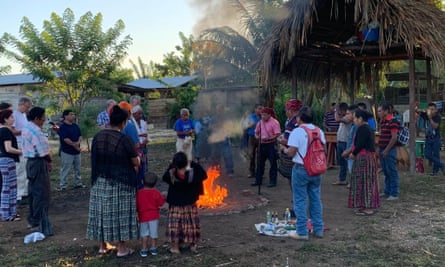In meetings, Domingo Choc Che was quiet and reflective, speaking up only once others had said their piece. But he would come alive when he entered the jungles of Guatemala’s northern Petén department, sharing his knowledge of traditional medicines with anyone who wanted to learn.
“He was more at ease with plants,” said Mónica Berger, a sociologist and anthropologist at the University of the Valley of Guatemala who worked closely with Choc Che, a member of the indigenous Maya Q’eqchi community.
Choc Che was an ajilonel, or specialist in Mayan medicine, who worked to conserve traditional knowledge and herbal remedies. He was a member of the Relebaal Saqe association of councils of spiritual guides and had also participated in a series of scientific research projects, including with University College London.
Last year, he was tortured, set on fire and killed by neighbors in the village of Chimay after he was accused of performing witchcraft. Three people were sentenced to 20 years in prison for their part in the killing.
But the verdict has not reassured indigenous spiritual guides and herbalists who say that the judge reduced the charges from murder to homicide, ignored Choc Che’s status as a spiritual leader and downplayed the influence of Christian extremism in his killing.
“The sentence failed to understand the role of a spiritual guide in the community,” said Juan Castro, the Choc Che family’s lawyer. “[The court] considers it just one more death.”
The three defendants, Romelia Caal Chub, Edyn Arnoldo Pop and Candelaria Magaly Pop, accepted their responsibility but throughout the trial they attacked Choc Che’s character and accused him of witchcraft.
The Catholic church denied that religious beliefs had played a role, with Bishop Mario Fiandri saying that the murder had been precipitated by “a problem between two families”.
Choc Che’s murder and its aftermath reflect continued intolerance against indigenous traditions in Guatemala. Approximately 43% of the country’s population identify as indigenous, but Christians routinely accuse Mayan spiritual leaders of witchcraft.
“They are convinced that they are going to go to heaven for removing evil or for removing the devil from their villages,” Berger said. “And they firmly believe that these [spiritual guides] represent the devil. So that extreme intolerance has followed a total lack of knowledge and understanding of what Mayan spirituality is, and this is very dangerous.”
Mayan spirituality traces its roots back thousands of years, and traditions of time-keeping, medicines and social organization have been preserved through many generations.

But since the Spanish conquest, such beliefs have come under sustained attack by both Catholic and evangelical Protestant churches.
In colonial times, indigenous communities were forced to convert, and Catholic churches were built on ceremonial sites. Evangelical and Pentecostal groups began to gain influence in the 1970s, especially after a devastating 1976 earthquake, and Christians of all denominations often associate indigenous traditions with witchcraft.
“There is a permanent persecution against the Maya spiritual guides, against traditional medics, and against ancestral authorities in the 21st century,” said Felipe Gómez, who works with the Oxlajuj Ajpop association of spiritual guides.
“Evangelical and Catholic churches all share some responsibility” for [Choc Che’s] death, Gómez said. “It was an action against the spirituality and the exercise of ancestral medicine. And not just against Domingo Choc, but all those who practice Maya spirituality, traditional medicine and ancestral authorities. This affects everyone.”
Anti-indigenous racism contributed to the savagery inflicted by Guatemala’s armed forces during the country’s 36-year civil war: according to a UN-backed truth commission, indigenous people represented more than 80% of the 200,000 people killed and 45,000 people disappeared.
That conflict ended in 1996, but attacks on those who practice traditional Mayan spirituality and medicine have continued, especially in rural communities where evangelical missionaries are active.
“They are obliging the people to abandon their sacred spaces,” Gómez said. “The evangelical church is dividing families and communities.”
In the weeks after Choc Che was killed, three people in the highland municipality of Cobán were accused of performing witchcraft and threatened with death. In January 2021, Jesús Choc Yat, a spiritual guide, was abducted, tortured and killed in the region of Quiché.
But the majority of such attacks go unreported, said Berger.
Indigenous spiritual leaders have sought meetings with Christian authorities in the hopes of establishing mutual respect and acceptance, but they have found little enthusiasm for dialogue. At one such meeting, the Evangelical Alliance of Guatemala handed out Bibles.
“We have never desired a confrontation with either the Catholic or evangelical churches,” Gómez said. “We want them to respect us.”
